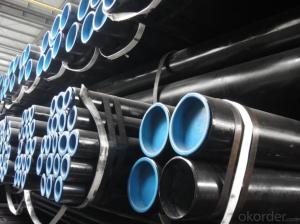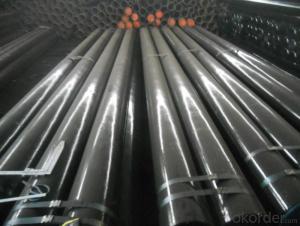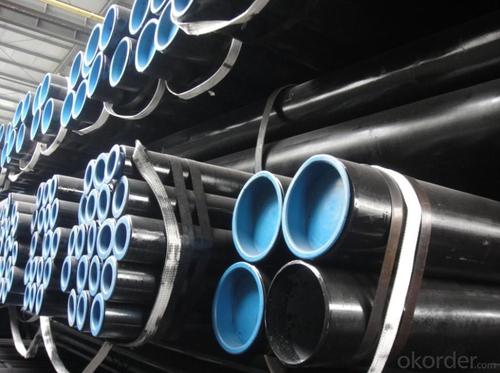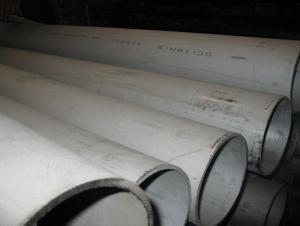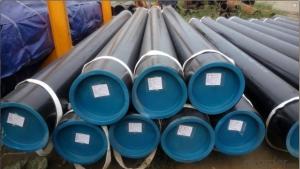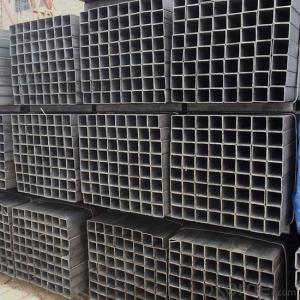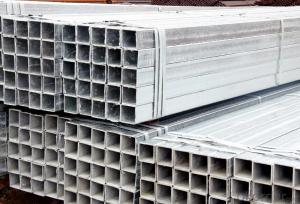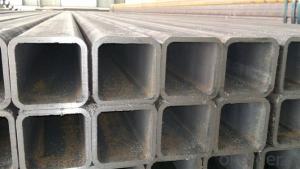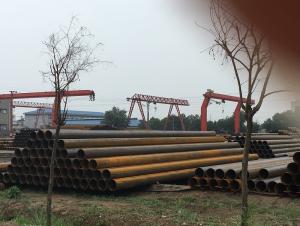Seamless hot rolled black steel pipe Gr.B
- Loading Port:
- Tianjin
- Payment Terms:
- TT OR LC
- Min Order Qty:
- 10 m.t.
- Supply Capability:
- 10000 m.t./month
OKorder Service Pledge
OKorder Financial Service
You Might Also Like
1. Commodity Name: Seamless steel pipe
2. Standard: API,GB,ASTM,ASME,DIN
3. Quality grade: 10#, 20#, A106B, A53B, API 5L B, Q235, Q345, ST37-2, ST 45, ST52.etc.
4. Dimension:
OD: 1/2"-24"
WT: 2.5-80mm, SCH10~SCH40~XXL
length: 5.8m,6m,8m,9m,12m
5. Technique: Hot Rolled/Cold Rolled/ Cold Drawn
6. application
carbon seamless steel pipes are widely used in gas, water and oil, transpotation;constructions;Bridge,highway,windows of model steel door; building materials;fences;heating facilities Fluid Pipe;conduit pipe,scaffolding pipe.etc.
7. Payment Terms: L/C D/A D/P T/T
8.packing and shipment
Packaged in bundles,as per customers' requirements, it can also bepackagesd as beveled ends, typed marking, black painting, plastic caps protection,woven bags packing
For 20" container the max length is 5.8m; For 40" container the max length is 12m. other options are available based on customer requests. Please discuss when placing orders.
9. Surface: painted with varnish;
10. Plastic caps at ends.
11. Tolerance: OD +1%/-1%
WT +12.5%/-10%
12. Chemical composition:
Models of Steel Pipes | Chemical Component | |||||||
Steel 20 (ASTM A106B) | C | Si | Mn | P | S | Cu | Ni | Cr |
0.17~0.24 | 0.17~0.37 | 0.35~0.65 | 0.035max | 0.035max | 0.25max | 0.25max | 0.25max | |
Steel45 (ASTM 1045) | 0.42~0.50 | 0.17~0.37 | 0.50~0.80 | 0.035max | 0.035max | 0.25max | 0.25max | 0.25max |
16Mn(Q345B) | 0.12~0.20 | 0.20~0.55 | 1.20~1.60 | 0.035max | 0.035max | 0.25max | 0.25max | 0.25max |
45Mn2 ( ASTM1345) | 0.42~0.49 | 0.17~0.37 | 1.40~1.80 | 0.035max | 0.035max | 0.3max | 0.3max | 0.30max |
- Q: How are steel pipes threaded for connection?
- Steel pipes are threaded for connection using a threading machine or a die. The pipe is clamped securely into the machine, and a rotating die is then used to cut threads into the pipe's surface. This process creates the necessary grooves and ridges that allow the pipes to be securely connected together.
- Q: How are steel pipes used in the manufacturing of shipbuilding and offshore structures?
- Steel pipes are essential components in the manufacturing of shipbuilding and offshore structures. They are widely used due to their strength, durability, and resistance to corrosion, making them ideal for the harsh marine environment. In shipbuilding, steel pipes are used for various purposes. One of the main applications is in the construction of the hull, the framework that provides structural support to the ship. Steel pipes are used to form the keel and the frames, which help to maintain the shape and strength of the hull. These pipes are welded together to create a robust and rigid structure that can withstand the forces exerted on the ship during navigation. Moreover, steel pipes are used in the construction of various systems onboard the ship. For instance, they are utilized in the piping system for transporting fluids like fuel, water, and oil throughout the vessel. Steel pipes are also employed in the ventilation and air conditioning systems, ensuring proper airflow and temperature control within the ship. In offshore structures, such as oil rigs and platforms, steel pipes play a crucial role. These structures are typically subjected to extreme environmental conditions, including severe weather, high pressure, and corrosive saltwater. Steel pipes are used to fabricate the legs, risers, and other load-bearing components of offshore structures. These pipes provide the necessary strength and stability, allowing the structure to withstand the forces exerted by waves, wind, and drilling operations. Additionally, steel pipes are utilized in the construction of subsea pipelines. These pipelines are used to transport oil, gas, and other fluids from offshore drilling sites to onshore facilities. Steel pipes are preferred due to their high tensile strength and ability to withstand the high pressure and corrosive conditions found in subsea environments. Overall, steel pipes are indispensable in the manufacturing of shipbuilding and offshore structures. Their exceptional strength, durability, and corrosion resistance make them the preferred choice for constructing hulls, systems, and load-bearing components. Without steel pipes, the construction of ships and offshore structures would be significantly compromised in terms of safety, reliability, and longevity.
- Q: How are steel pipes used in the manufacturing of aerospace components?
- Steel pipes are used in the manufacturing of aerospace components as they provide structural support and durability. They are commonly used for fuel and hydraulic systems, allowing for the safe and efficient transfer of fluids throughout the aircraft. Additionally, steel pipes are utilized in the fabrication of engine components and airframe structures, ensuring strength and reliability in the demanding aerospace environment.
- Q: How are steel pipes measured and sized?
- Steel pipes are measured and sized based on their diameter and wall thickness. The standard unit for measuring steel pipes is the nominal pipe size (NPS), which is a North American set of standard sizes for pipes. The NPS is based on the internal diameter (ID) of the pipe, while the wall thickness is specified by the schedule number. The schedule number indicates the thickness of the pipe walls, with higher numbers representing thicker walls. Additionally, steel pipes can also be measured and sized using outside diameter (OD) and wall thickness in millimeters or inches.
- Q: How are steel pipes protected against external mechanical damage?
- Steel pipes are often protected against external mechanical damage through a variety of methods such as applying corrosion-resistant coatings, using protective sleeves or wraps, and implementing casing or encasement systems. These measures help to safeguard the pipes from potential physical harm caused by external factors like impact, abrasion, or heavy loads, thus ensuring their integrity and longevity.
- Q: Are steel pipes suitable for use in acidic environments?
- Yes, steel pipes are generally suitable for use in acidic environments. However, the specific grade of steel and the concentration of the acid should be considered to ensure proper corrosion resistance. Coating or lining the pipes with materials such as epoxy or rubber can also enhance their resistance to acidic conditions.
- Q: Can steel pipes be used for underground sewage treatment plants?
- Indeed, underground sewage treatment plants can utilize steel pipes. These pipes are frequently employed in underground settings due to their ability to endure, their strength, and their resistance to corrosion. They can withstand the harsh conditions found underground and effectively transport sewage within the treatment facility. Furthermore, steel pipes can be tailored to meet the specific needs of the sewage treatment plant, including varying diameters and wall thicknesses to ensure proper flow and drainage. Additionally, these pipes can be coated or lined with protective materials, enhancing their resistance to corrosion and prolonging their lifespan. All in all, steel pipes are a dependable and suitable option for underground sewage treatment plants.
- Q: Can steel pipes be used for underground fire protection systems?
- Yes, steel pipes can be used for underground fire protection systems. Steel pipes are commonly used in underground applications due to their durability, strength, and resistance to corrosion. They provide an effective means of delivering water for fire suppression in underground areas, ensuring the safety of the surrounding infrastructure.
- Q: What are the different grades of steel used in manufacturing pipes?
- The different grades of steel used in manufacturing pipes are typically categorized based on their chemical composition and mechanical properties. Some common grades include carbon steel, stainless steel, alloy steel, and duplex steel. Each grade has its own unique characteristics and is chosen based on the specific requirements of the application, such as corrosion resistance, strength, and temperature resistance.
- Q: What are the factors to consider while selecting steel pipes for a project?
- When choosing steel pipes for a project, there are several key factors to take into account. These factors encompass the material composition of the steel, the dimensions of the pipes, the intended use, the environmental conditions, and the allocated budget. Firstly, the material composition of the steel pipes plays a vital role in determining their strength, resistance to corrosion, and overall durability. Carbon steel, stainless steel, and alloy steel are commonly used types of steel for pipes, each possessing unique characteristics suitable for different applications. Secondly, the dimensions of the pipes, including diameter and wall thickness, should be carefully considered. It is crucial to ensure that these dimensions align with the project requirements and the system in which the pipes will be installed. This ensures that the selected pipes can effectively handle the required flow rates and pressures. Thirdly, thorough assessment of the intended application of the steel pipes is necessary. Different projects may demand pipes with specific features, such as heat resistance, pressure resistance, or the ability to transport particular substances like gas, oil, or water. Understanding these application requirements aids in selecting the appropriate type of steel pipes. Evaluation of the environmental conditions in which the pipes will be installed is also important. Factors such as temperature fluctuations, exposure to moisture, corrosive substances, and external pressures must be taken into account. For example, if the project involves underground installation or exposure to corrosive chemicals, corrosion-resistant steel pipes may be necessary. Lastly, the allocated budget for the project is a significant consideration. The cost of steel pipes can vary depending on their material composition, dimensions, and additional features. Striking a balance between project requirements and available budget ensures cost-effectiveness without compromising the quality and performance of the pipes. In conclusion, the selection of steel pipes for a project necessitates careful consideration of factors including material composition, pipe dimensions, intended application, environmental conditions, and budget. By thoroughly evaluating these factors, one can choose the most suitable steel pipes that meet project requirements, ensuring long-term performance and durability.
Send your message to us
Seamless hot rolled black steel pipe Gr.B
- Loading Port:
- Tianjin
- Payment Terms:
- TT OR LC
- Min Order Qty:
- 10 m.t.
- Supply Capability:
- 10000 m.t./month
OKorder Service Pledge
OKorder Financial Service
Similar products
Hot products
Hot Searches
Related keywords
